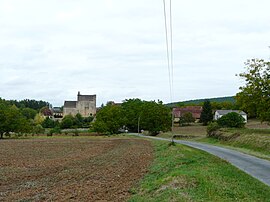Sergeac
Sergeac | |
|---|---|
 A general view of Sergeac | |
| Coordinates: 45°00′12″N 1°06′26″E / 45.0033°N 1.1072°E | |
| Country | France |
| Region | Nouvelle-Aquitaine |
| Department | Dordogne |
| Arrondissement | Sarlat-la-Canéda |
| Canton | Vallée de l'Homme |
| Government | |
| • Mayor (2020–2026) | Isabelle Daumas-Castanet[1] |
Area 1 | 10.71 km2 (4.14 sq mi) |
| Population (2022)[2] | 215 |
| • Density | 20/km2 (52/sq mi) |
| Time zone | UTC+01:00 (CET) |
| • Summer (DST) | UTC+02:00 (CEST) |
| INSEE/Postal code | 24531 /24290 |
| Elevation | 66–271 m (217–889 ft) (avg. 70 m or 230 ft) |
| 1 French Land Register data, which excludes lakes, ponds, glaciers > 1 km2 (0.386 sq mi or 247 acres) and river estuaries. | |
Sergeac (French pronunciation: [sɛʁʒak]; Occitan: Sarjac) is a commune in the Dordogne department in Nouvelle-Aquitaine in southwestern France. It lies in the Périgord Noir area. Positioned along the Vézère River, the village is surrounded by high cliffs that house several prehistoric sites, including the Castel Merle rock shelters. These shelters were occupied by Neanderthals and later by Cro-Magnons. The village also features a Romanesque church dating from the 11th century, constructed over Roman ruins.[3]
Population
The area of Sergeac is 10.71 km2.
| Year | Pop. | ±% p.a. |
|---|---|---|
| 1968 | 137 | — |
| 1975 | 142 | +0.51% |
| 1982 | 133 | −0.93% |
| 1990 | 156 | +2.01% |
| 1999 | 172 | +1.09% |
| 2007 | 192 | +1.38% |
| 2012 | 221 | +2.85% |
| 2017 | 216 | −0.46% |
| Source: INSEE[4] | ||
Gallery
- Neolithic polished ax - Muséum de Toulouse.
See also
References
- ^ "Répertoire national des élus: les maires". data.gouv.fr, Plateforme ouverte des données publiques françaises (in French). 9 August 2021.
- ^ "Populations de référence 2022" (in French). The National Institute of Statistics and Economic Studies. 19 December 2024.
- ^ "Village of Sergeac in SERGEAC - Lascaux Dordogne Vézère Valley". Lascaux Dordogne Vallée Vézère. Retrieved 25 October 2024.
- ^ Population en historique depuis 1968, INSEE
External links




